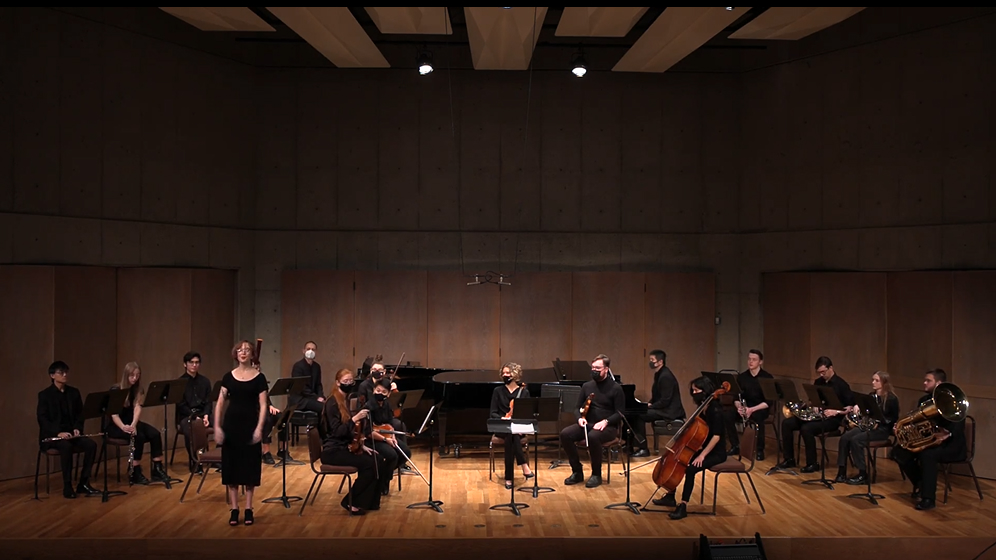
For years now, the Phillip T. Young Recital Hall has been holding concerts. As the main performance space for the UVic School of Music, the venue has hosted everything from faculty string quartets to visiting classical guitarists to student chamber orchestras, and has consequently become a big name in the Victoria classical music scene. Last Tuesday, however, a special concert took to the stage, a concert determined to be different from all others.
Like much of academia, music school presents the world in a predominantly Western manner. In music theory classes, students learn how to write harmonies like Bach did. In music history, they study Mozart’s virtuosic childhood, Beethoven’s influence, and Brahms’ approach to melody. Their performances, too, are eurocentric, pulling heavily on the canon of the Western Classical tradition.
This school-wide lack of diversity has been on the minds of the Music Students’ Association (MSA) for a while now. Since August of 2020, they have been working on an equity, diversity and inclusion (EDI) focused concert. Titled “Amplifying Voices: Integrating Underrepresented Identities in Music”, the performance finally came together this month, just in time for UVic’s 5 Days of Action initiative.
The event began with a land acknowledgement from Karla Point, the Indigenous Resurgence Coordinator for the faculty of Fine Arts. Unlike many land acknowledgements — those 30 seconds during which a settler reads the University’s prepared speech on the matter, then launches into their main presentation without segue or reflection — Point’s statement was thought-provoking, and encouraging.
“It’s important to know who are the local Indigenous people where you live,” she said. “Who are they? And how can you be connected to them? … [Decolonization] begins with a phrase, a statement; eventually, the hope is they become action.”
The music portion of the concert began with a performance by members of UVic’s symphony orchestra, performing movement one from Samuel Coleridge-Taylor’s Petite Suite de Concert. Coleridge-Taylor was a West African-English composer of the late-Romantic era. The piece is a driving, energizing work, just as enjoyable, impressive, and, for lack of a better word, classical music-esque as any other, more canonized pieces likely to be found on a symphony program.
Next up was UVic music student Ayari Kasukawa, performing Fuminori Tanada’s Mysterious Morning III on soprano saxophone. In attempting to summarize this piece, I find myself seeking out Western Musical terms and methods of understanding, but to apply those feels patronizing. The Western canon has long emphasized a certain sound, that sweet, comfortable sound found in Mozart or Beethoven, for example. Mysterious Morning III is not sweet, but it took creativity to write, virtuosity to play, and commands attention like any good, ‘classical’ work.
French horn student Tyrell Loster Peitzche followed with Okukoowoola Kw’Ekkondeere, a piece by Ugandan composer Justinian Tamsuza. Here, I am tempted to compare the work to a fanfare, but again this feels disrespectful. It shouldn’t have to be Western, or Western-like, to be a valid piece of music. While overall a mesmerizing example of solo horn repertoire, the use of percussion was particularly compelling.
The concert was closed with the works of two student composers: the third movement of Zihan Zhao’s piano piece Petals on the Palette of Vincent, and the jazz piece ‘Cation by Marc Micu. Testimonies to the potential of the next generation of musicians, both Zhao’s introspective setting and Micu’s irresistible groove were highlights of the program.
The second half of Amplifying Voices featured a panel on building a new standard in music. Hosted by student moderator Lucas Hung, the discussion featured school of music faculty Dr. Anthony Tan and Dr. Steven Capaldo, as well as the Victoria Symphony’s principal violist, Kenji Fusé; artist, musician and UVic student Lindani Khoza; and Pacific Opera’s Rebecca Hass.
As the dialogue opened, each panelist took a moment to introduce themselves, and explain their role in equity, diversity and inclusion (EDI) in music. Hass, who introduced herself as “Métis from the Georgian Bay area,” discussed the challenges she faced as a young woman in music school.
“When I [was in university], there [was] one way to be successful, there [was] one understanding of what a classical career looks like,” she said. “I left the other part of myself, musically, behind.”
Khoza, originally from South Africa, also said he struggled to reconcile his identity with the Western music he was taught.
“The music that I was learning wasn’t my music,” he said.
At UVic, Micu echoed these same themes, adding that the curriculum remains eurocentric.
“It’s been Haydn, Beethoven, Mozart, etc., when we should also be focusing [on] and showcasing non-Western composers.”
Micu praised the MSA for “giv[ing] non-Western composers a voice and a platform to showcase their works” but said that the School of Music is still “not doing enough” for EDI.
According to MSA president Nic Murker, diversifying the School is “an ongoing conversation”, and Amplifying Voices is just the beginning. Murker says the students’ association is currently developing a UVic Music EDI committee, and is hoping to host an Amplifying Voices follow-up event next semester.
“Change cannot happen if the conversation ends after just one concert,” they said. “It was a great concert, but it’s not enough.”







